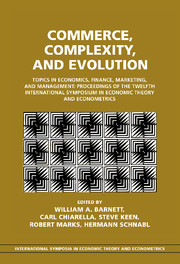 Commerce, Complexity, and Evolution
Commerce, Complexity, and Evolution Book contents
- Frontmatter
- Contents
- Series editor's preface
- Volume editors' preface
- Editors
- List of contributors
- I Philosophical and methodological implications of complexity and evolution in economic systems
- II Finance and the macroeconomy
- III Market and sectoral dynamics
- IV Marketing and interdependent behavior
- 15 A complex-systems simulation approach to evaluating plan-based and reactive trading strategies
- 16 Genetic algorithms and evolutionary games
- 17 Evolved perception and the validation of simulation models
- 18 The application of cellular-automata and agent models to network externalities in consumers' theory: a generalization-of-life game
18 - The application of cellular-automata and agent models to network externalities in consumers' theory: a generalization-of-life game
Published online by Cambridge University Press: 05 December 2011
- Frontmatter
- Contents
- Series editor's preface
- Volume editors' preface
- Editors
- List of contributors
- I Philosophical and methodological implications of complexity and evolution in economic systems
- II Finance and the macroeconomy
- III Market and sectoral dynamics
- IV Marketing and interdependent behavior
- 15 A complex-systems simulation approach to evaluating plan-based and reactive trading strategies
- 16 Genetic algorithms and evolutionary games
- 17 Evolved perception and the validation of simulation models
- 18 The application of cellular-automata and agent models to network externalities in consumers' theory: a generalization-of-life game
Summary
It is usually assumed in economic theories that a consumer's utility depends only on his or her own consumption: A person's preference is not affected by other people's behavior. However, this is not always the case; to buy a suit, an antique, or a computer, one may consider how many other people have the same product. If a person's optimal decision depends on the number of those who make the same decision, it is said that there are behavioral dependencies resulting from network externalities. In this chapter we develop a cellular-automata (CA) model to describe the dynamics of markets with network externalities.
Behavioral dependence resulting from network externalities is not a new subject in economics. Not a few theoretical and empirical studies have been done about it among consumers since Liebenstein (1948) introduced the concept of bandwagon and snob effects; among recent related studies are those of Choi (1994), Church and King (1993), Curien and Gensollen (1990), Ducan (1990), Kesteloot (1992), and Liebowitz and Margolis (1994). Unfortunately, the conventional equilibrium analysis of markets with network externalities (Pyndyck and Rubinfeld 1990) seems to inappropriately express the dynamic process of such markets. Recent studies of Bikhchandani et al. (1992), Arthur and Lane (1993), Narduzzio and Warglien (1996), and Lane and Vescovini (1996) are more dynamical and clarify some interesting patterns of diffusion processes.
Nevertheless these mathematical models presume that behavioral dependence is sequential: They assume that the kth person observes all or some of his or her k – 1 preceding persons but not in reverse.
- Type
- Chapter
- Information
- Commerce, Complexity, and EvolutionTopics in Economics, Finance, Marketing, and Management: Proceedings of the Twelfth International Symposium in Economic Theory and Econometrics, pp. 351 - 372Publisher: Cambridge University PressPrint publication year: 2000
